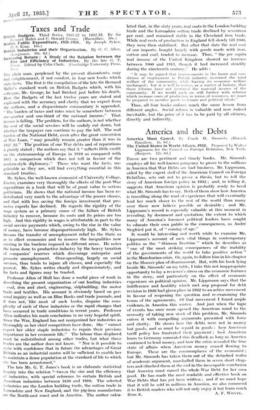America and the Debts
The United States in World Affairs, 1932. Prepared by 'Walter
Lippman!' for the Council on Foreign' Relations, New York. (Harpers. 12s. 6d.)
THESE are two pertinent and timely books. Mr. Simonds employs all his well-known pungency to prove to the millions in AnMrica that War Debts are bad business. Mr. Lippmann, aided by the expert staff of the American Council en Foreign Ilelattans, sets out not to prove a thesis, but to tell the story of American foreign policy in 1932 ; and, in telling it, suggests that American opinion is probably ready to heed what Mr. Simonds has to say. Both of them show how America is travelling along the road of experience that will eventually lead her much closer to the rest of the world than many over there now believe possible or desirable ; and Mr. Lippmann's record is especially valuable at this moment in revealing, by document and quotation, the extent to which many of America's foremost political leaders have sought to educate their own public in the consequences, as Andre Siegfried put it, of " coming of age."
It would be interesting and worth while to examine Mr. Lippmann's account of such vital things in contemporary politics as the " Stiinson Doctrine " which he describes as " one of the most striking consequences of the inability of the governments of the world to take positive action " in the Manchurian crisis. Or, again, to follow him in his chapter on the Hoover plan of disarmament. But, with his book lying beside Mr. Simonds' on my table, I take this not inappropriate opportunity to lay a reviewer's stress on the economic features in the story, and particularly on the effect of economic experience on political opinion. Mr: Lippmann says that the indifference and hostility which met any proposal for debt revision in 1926 had given place in 1982 to an active movement in favour. of reopening the question and re-examining the terms of the agreements. Of that movement I found ample evidenee_in. America. this winter. And just when the logic of events has once more opened the American mind to the necessity of taking new stock of this problem, Mr. Simonds enters it with compelling arguments presented with force and clarity. He shows how the debts were not in money but 'goods, and so must be repaid in goods : how American tariff policy has frustrated their payment : how American loans to Germany concealed thisdeadlock as long as America continued to lend money, and how the crisis revealed the true state of affairs when American money ceased flowing to Europe. These are the commonplaces of the economist ; but Mr. Simonds has taken them out of the detached realm of academic argument, marshalled them in seven short chap- ters and clinched them at the end in the inescapable conclusion that America must cancel the whole War Debt for her own good. He has made the most readable and effective book on War Debts that has yet been written ; and if we must hope that it will be sold in millions in America, we also commend it to British readers who will not only enjoy it but learn much






































 Previous page
Previous page